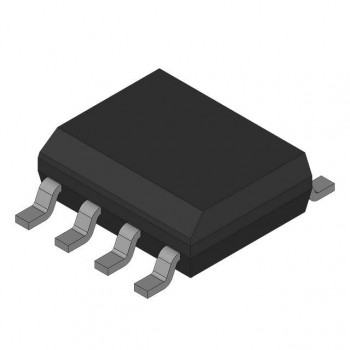When designing a product, choosing the right microcontroller unit (MCU) is crucial. The selection of MCU not only directly affects the performance and power consumption of the product, but also has an important impact on cost and resource utilization. MCU off-the-shelf supplier TOPCHIP ELECTRONICS will list the key factors that need to be considered during the MCU selection process and introduce several common MCU manufacturers.

1. Power/efficiency
When selecting an MCU, there is a trade-off between processing performance and power consumption. Some energy-saving microcontrollers include STMicroelectronics’ STM32 series, NXP’s Kinetis L series, Renesas’ H8 ultra-low-power series, Cypress’s PSoC 6 series, Microchip’s ultra-low-power PIC series, and TI’s MSP430 series.
2. Temperature resistance
Depending on the environment in which the MCU operates, temperature resistance is also an important factor to consider. Some temperature-resistant microcontrollers include STMicroelectronics’ STM32F103 series, NXP’s Kinetis EA series, Renesas’ RX24T and RX24U series, Infineon’s XMC series and AURIX™ series, Microchip’s PIC and AVR microcontrollers, and TI MSP430F2619S-HT.
3. Security
As the number of IoT devices increases, the security requirements for MCUs are also increasing. Some MCU manufacturers have implemented security strategies such as encryption and physical security, such as STMicroelectronics’ ST33 series, Renesas’ AE-5 and RS-4 series, Infineon’s OPTIGA Trust and OPTIGA TPM, Cypress’s PSoC 64, Microchip's 32-bit and 16-bit MCUs for security, and TI's MSP430 series.
4. Encapsulation
The packaging of a microcontroller directly affects its size and performance. Choosing the right package type is crucial, and some of the smallest microcontrollers include Microchip’s ATtiny20 UUR, Cypress’s PSoC 4000, NXP’s LPC1102UK, STMicroelectronics’ STM32F042T6Y6, and TI’s MSP430G2252.
5. Processing power
Based on the task requirements, the processing capabilities of the MCU need to be evaluated. A single-core processor may be sufficient for basic needs, but for tasks requiring higher performance, you may want to consider a dual-core processor or a multi-core processor. This is where you need to weigh the relationship between processing speed and energy consumption, and consider whether a graphics processing unit (GPU) is needed.
6. Memory space
The amount of memory (RAM and ROM) required depends on the program you want to run. More programs require more random access memory (RAM). Additionally, if a graphics processing unit (GPU) is required, more RAM and faster read/write times are required.
7. Hardware interface
The nature of the task determines the need for hardware interfaces such as USB, Wi-Fi, Bluetooth, audio, video or camera. When selecting an MCU, you need to consider the type and number of hardware interfaces it supports.
8. Software architecture
Some microcontrollers can run on multiple operating systems, while others cannot. If expansion is required, it is best to use the same software architecture to increase interoperability.
9. Cost
Finally, cost is also an important consideration. Microcontrollers come in a wide price range, and you need to choose the right MCU based on your product design requirements and budget.
In short, choosing a suitable MCU requires comprehensive consideration of processing power, memory space, hardware interfaces, software architecture, cost and other factors to ensure that the final MCU selected can meet the needs of product design and is within the budget.
When purchasing MCUs, go to TOPCHIP ELECTRONICS. Our company always has MCUs from all major brands in stock. Orders can be placed on the same day and can be shipped as soon as the same day. We provide manufacturing manufacturers with services such as selection guidance, product substitution, sample testing, and technical support. If you have any inquiries please contact via the following email address:
Recommended recent MCU hot-selling models
| Part Number | Description |
|---|---|
| MCF52223CAF66 | IC MCU 32BIT 256KB FLASH 100LQFP |
| SAB-C167CS-LMCA+ | LEGACY 16-BIT MCU |
| LM3S2939-IQC50-A2T | IC MCU 32BIT 256KB FLASH 100LQFP |
| TM4C1233H6PZI | IC MCU 32BIT 256KB FLASH 100LQFP |
| MSP430F5502IRGZT | IC MCU 16BIT 24KB FLASH 48VQFN |
| PIC18F47Q10-E/P | IC MCU 8BIT 128KB FLASH 40DIP |
| PIC18F4685-I/P | IC MCU 8BIT 96KB FLASH 40DIP |
| HD6303YRP | MCU 4-8BIT GENERAL ROMLESS |
| MSP430F1101IPW | IC MCU 16BIT 1KB FLASH 20TSSOP |
| ATTINY13A-SUR | IC MCU 8BIT 1KB FLASH 8SOIC |
| R5F51118ADFL#3A | IC MCU 32BIT 512KB FLASH 48LFQFP |
| PIC24HJ64GP206A-I/MR | IC MCU 16BIT 64KB FLASH 64VQFN |
| ATMEGA644PV-10AUR | IC MCU 8BIT 64KB FLASH 44TQFP |
| TMS5700432BPZQQ1R | IC MCU 16/32B 384KB FLSH 100LQFP |
| PIC16LF72-I/SS | IC MCU 8BIT 3.5KB FLASH 28SSOP |
| PIC24F08KL301-I/MQ | IC MCU 16BIT 8KB FLASH 20VQFN |
| PIC32MX440F256H-80V/PT | IC MCU 32BIT 256KB FLASH 64TQFP |
| R5F523T3ADFL#30 | IC MCU 32BIT 64KB FLASH 48LFQFP |
| MC9S08QG8CFKE | IC MCU 8BIT 8KB FLASH 24QFN |
| STM32F446ZEJ6TR | IC MCU 32BIT 512KB FLSH 144UFBGA |

